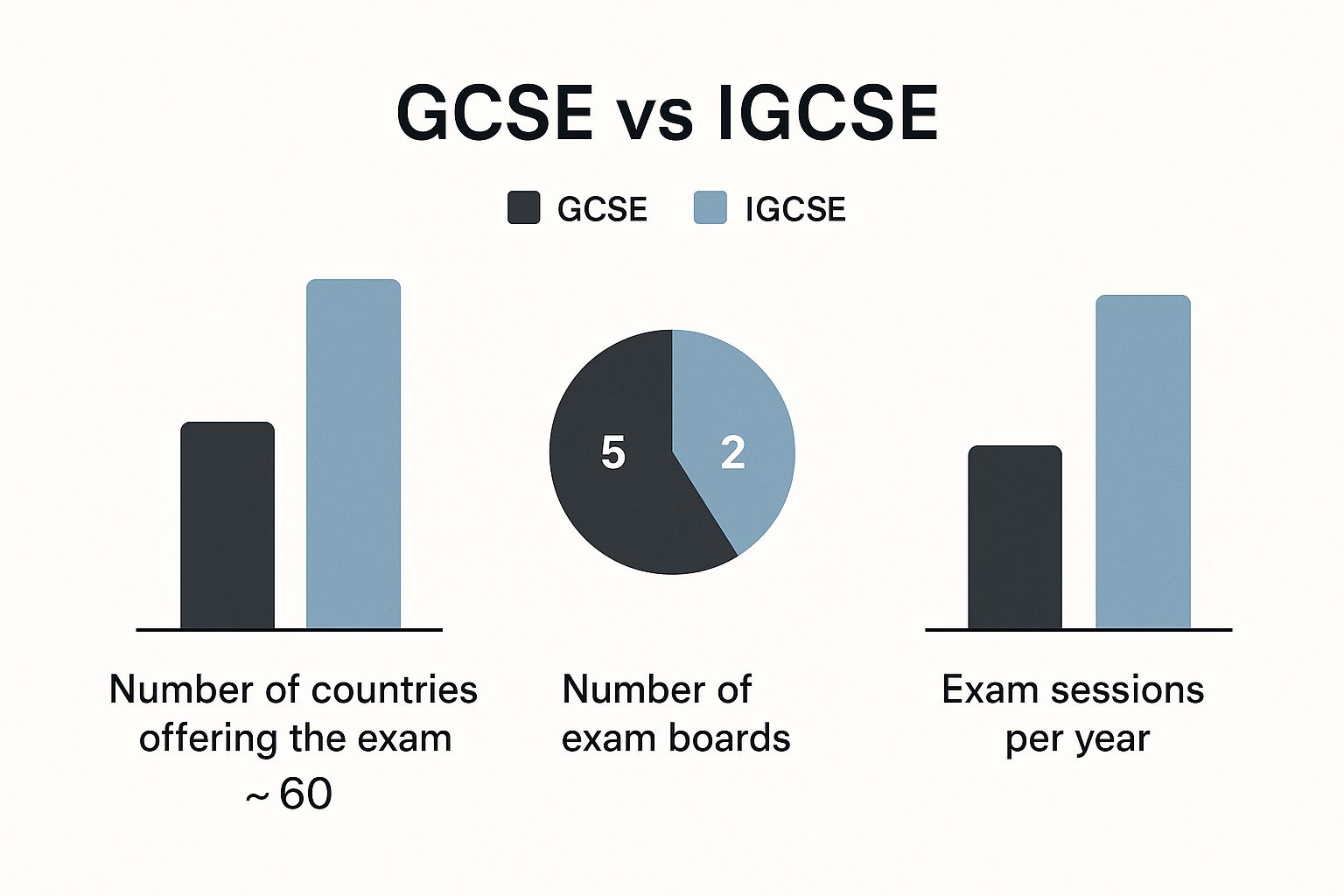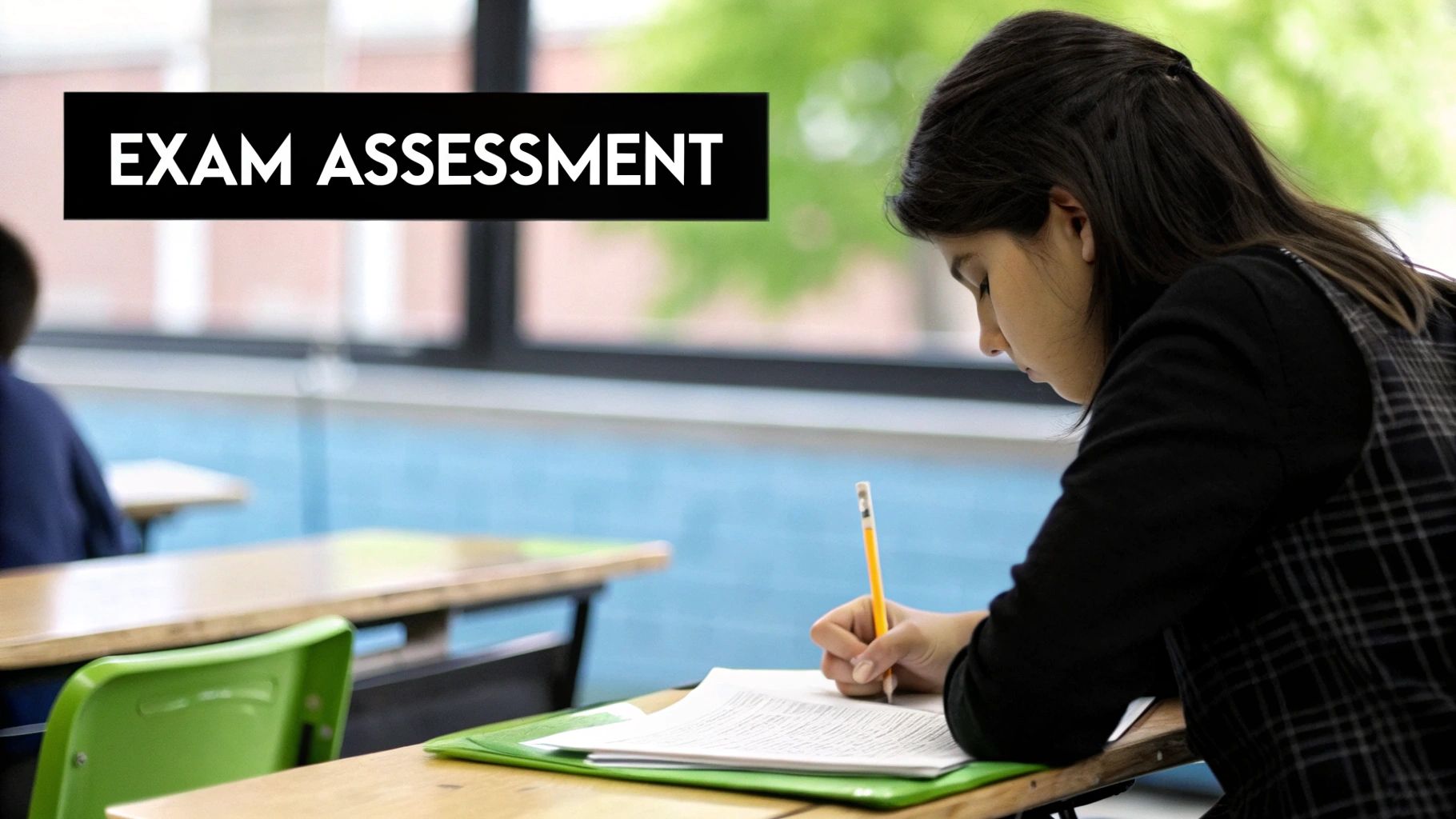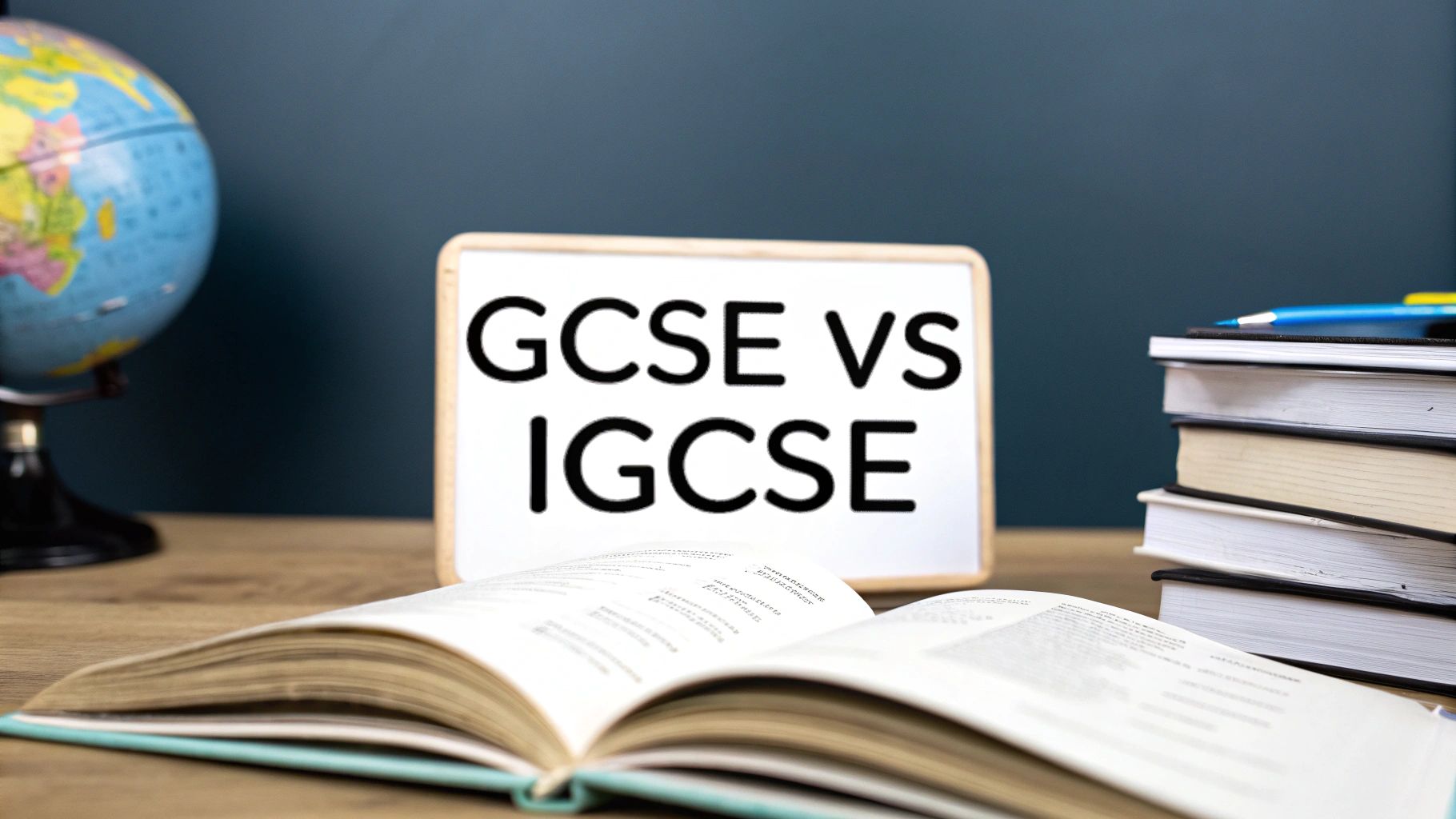Facing the GCSE versus IGCSE decision can feel like a monumental moment in your child's education. It’s more than just acronyms; it’s about finding a path that nurtures their unique learning style, sparks their curiosity, and supports their well-being. This guide is here to demystify the choice, putting your child and their needs at the very heart of the conversation.
At its core, the main difference is simple: GCSEs are the standard UK qualification, deeply rooted in the national curriculum, while IGCSEs are the international equivalent, designed for students worldwide. Your choice really comes down to a feeling: will your child feel more connected to a curriculum with a UK-centric context, or will they light up when exploring one with a broader, more global perspective?
This decision can feel daunting, but we'll break it down into manageable parts. We want to transform this potentially stressful choice into an empowering opportunity to select an educational journey that truly fits your child and your family's circumstances, making them feel seen and understood.

As you can see, the IGCSE has a significantly wider international footprint. This is often a crucial factor for families living abroad, those considering relocation, or for a child who feels a natural pull towards a curriculum that feels less tied to one specific country. Now, let’s explore these differences in more detail.
GCSE vs IGCSE At a Glance
To give you a clear, quick overview, we've put together a simple table highlighting the key distinctions. Think of this as your starting point for understanding what sets GCSEs and IGCSEs apart, and how these differences might feel for your child.
| Feature | GCSE (General Certificate of Secondary Education) | IGCSE (International General Certificate of Secondary Education) |
|---|---|---|
| Target Audience | Primarily students in the UK following the national curriculum. | Students globally, including those in UK independent and online schools. |
| Curriculum Focus | Content is often UK-centric, reflecting British culture, history, and texts. | Content has a more international perspective, using global case studies and examples. |
| Assessment | A mix of final exams and, in some subjects, coursework or practical elements. | Historically more exam-based, though many subjects now offer coursework options. |
| Global Recognition | The gold standard in the UK and widely respected by universities internationally. | Recognised and accepted by universities and employers worldwide. |
This table shows the fundamental differences, but the best choice often comes down to how your child learns and what their future plans might be. For a child who thrives with the structure and focus of the UK system, exploring online GCSE courses can provide a flexible yet familiar educational framework, no matter where you are in the world.
Comparing the Curriculum and Learning Experience
When it comes to choosing between a GCSE and an IGCSE, the debate often boils down to one simple, emotional question: which path will truly capture my child's interest and make them feel excited to learn? The answer lies in the subtle but crucial differences in how each qualification approaches learning, which can shape their entire experience.
At their core, GCSEs are intrinsically linked to the UK's national curriculum. This means the learning is often steeped in British cultural and historical contexts. For a child who feels grounded by familiarity and can connect their studies to the world around them in the UK, this provides a powerful sense of relevance.
IGCSEs, on the other hand, were built from the ground up for a global audience. The curriculum deliberately uses international case studies and examples, which can be incredibly engaging for a child with a more worldly outlook. For example, in IGCSE Geography, a lesson on urbanisation might compare the growth of London with that of Mumbai, helping them view concepts through a wider, more diverse lens.
Core Subject Differences You Should Know
This contrast really comes to life when you look at specific subjects. English Literature is a perfect example of where the two qualifications can feel worlds apart for a young reader.
- GCSE English Literature: The syllabus often includes the mandatory study of classic British writers like Shakespeare. It’s a deep dive into the foundational texts that have shaped the UK's literary heritage.
- IGCSE English Literature: While Shakespeare is still a popular option, exam boards typically offer a much broader selection of texts from different countries and cultures, like a novel by Nigerian author Chinua Achebe or poetry from the Caribbean. This flexibility can be a game-changer for a student who might feel disconnected from older English works.
Neither approach is better—it’s about what will make your child feel seen and engaged in their learning. Will they come alive dissecting a classic sonnet, or will their imagination spark when exploring a contemporary novel from another part of the world?
The goal is to match the curriculum's focus to your child's natural curiosity. A student fascinated by global issues may feel more at home with IGCSE geography's international case studies, while one passionate about British history will find the GCSE syllabus deeply rewarding.
Historically, the assessment structures also differed, with IGCSEs being more exam-focused while GCSEs included more coursework. Recent reforms have brought them closer together, with GCSEs now also leaning heavily towards final exams.
Still, key content differences remain. The mandatory study of Shakespeare in GCSE English versus its optional status in IGCSE is a prime example of this lingering distinction. You can read more about how the qualifications compare and learn more about these educational pathways on KingsEducation.com.
Ultimately, it helps to visualise your child in each learning environment. Their day-to-day engagement is what builds confidence and fosters a genuine love for learning. Of course, ensuring they are well-prepared for whichever exam style they face is also crucial, which is why understanding how to revise for GCSEs effectively is a vital part of the journey.
How Assessment Methods Affect Student Well-Being
The pressure of exams is a very real concern for parents and students alike. That’s why understanding the difference between GCSE and IGCSE assessment models is so important for protecting your child’s confidence and mental well-being. The way a qualification is structured can dramatically change how a student feels about their own abilities.
While recent reforms have brought them closer, a key distinction often remains in their approach to testing. IGCSEs traditionally place a heavy emphasis on final examinations, testing a student's knowledge in a few high-stakes sittings. Some GCSE subjects, however, may still retain coursework or controlled assessment components, allowing marks to be built up over time. This seemingly small difference can have a huge emotional impact.

This is where you have to put your child’s personality at the centre of the decision. Is your child the type who thrives under pressure, able to recall information flawlessly in an exam hall? For them, an IGCSE’s exam-focused structure might feel refreshingly straightforward and clear.
Matching Temperament to Testing Style
On the other hand, many students feel immense anxiety knowing their entire grade rests on one or two performances. A child who is meticulous, creative, and prefers to develop their ideas thoughtfully over time may flourish with a GCSE that includes coursework. This model allows them to demonstrate their deep understanding without the intense pressure of a single, timed exam.
Think about these two very different students:
- The Performer: This student is confident and actually works well under pressure. They are skilled at revision and can perform at their best in a traditional exam setting. An IGCSE structure may suit their temperament perfectly, playing to their strengths.
- The Developer: This student is a deep thinker who excels with project-based work. They might get anxious in exams but produce outstanding, detailed work when given time. A GCSE with a coursework element could be vital for their academic success and self-esteem.
Choosing an assessment style that complements your child's natural abilities isn't about finding an 'easier' option. It's about giving them the best possible opportunity to demonstrate what they truly know, reducing unnecessary stress and building their confidence for future challenges.
When considering how different assessment methods might impact your child, especially if they have specific learning differences, exploring supportive resources is key. For example, understanding the best assistive technology for dyslexia can help you find tools that empower them to manage their studies and assessments more effectively, regardless of the qualification they choose. The right support makes all the difference.
University Pathways and Global Recognition
Ultimately, the choice between a GCSE and an IGCSE comes down to one core hope for any parent: making sure your child’s qualifications open the right doors for their future. It's easy to get anxious, wondering if you've picked the "best" path for university or future employment. The good news? Both qualifications are highly respected and lead to excellent opportunities.
For students planning to attend university here in the UK, there’s no practical difference between them. UK universities, including the most prestigious Russell Group institutions, view GCSEs and IGCSEs as direct equivalents. An application showing a string of strong IGCSE grades is assessed with exactly the same weight as one with GCSEs. You can feel confident that a UK-based future is secure with either choice.

The real distinction emerges when your child’s ambitions look beyond the UK's borders. For families considering an international future, the IGCSE often holds a distinct advantage.
Navigating International University Admissions
The "International" in IGCSE is more than just a name; it’s a language that admissions officers worldwide understand fluently. Because the curriculum is designed with a global student body in mind, universities across North America, Europe, Asia, and beyond are deeply familiar with its structure and grading. This can make the application process much smoother and more straightforward.
Let’s look at two practical scenarios:
- Applying to a US University: A student with IGCSEs is submitting a transcript that admissions teams have seen thousands of times. The global context in subjects like History or Business is immediately recognisable, making it easy for them to assess academic ability without needing to translate a UK-centric curriculum.
- Applying to a UK Russell Group University: A student with GCSEs presents a qualification that is perfectly aligned with the A-Level programmes these top universities expect. Their understanding of UK-specific contexts in subjects like English Literature is seen as ideal preparation for higher education in Britain.
The crucial takeaway is this: a UK-focused student loses nothing by choosing IGCSEs, but an internationally-focused student may gain a significant advantage. The IGCSE provides a universally understood academic passport.
This decision is a huge part of the journey, but it’s just the first step. To really support your child, it’s worth exploring practical advice on how to prepare for university applications, from personal statements to choosing the right courses. Regardless of the qualification, strong preparation is what truly builds the foundation for their future success and helps them stand out from the crowd.
A Look at Student Performance and Grading
One of the most common, unspoken questions parents have is this: is one of these qualifications secretly ‘harder’ than the other? You want to choose the path that gives your child the best possible chance to shine, and it’s completely natural to worry about making a misstep.
The truth, however, is far more nuanced than a simple "easier" or "harder" label.
Performance isn't really about the name of the qualification, but about the alignment between your child's learning style and the specific syllabus. Success here is deeply personal. A student who thrives on structured, practical science experiments might excel in one system, while another who loves analysing diverse literary texts might achieve higher grades in the other. It’s not about the difficulty of the paper but the connection your child feels with the content and how it's assessed.
When looking into student performance and grading, it can be helpful to explore various effective learning assessment strategies that go beyond just traditional exams. This wider view helps us understand how different students can show what they know in ways that best suit their strengths.
Unpacking the Data on Attainment
To move beyond feelings and anecdotes, looking at actual performance data can offer some clarity. Research shows that results often vary significantly not just between GCSE and IGCSE, but also between the different exam boards, like Pearson Edexcel and Cambridge.
This variation proves there’s no single answer to which qualification leads to better results; it really depends on the subject and the provider.
For example, studies have shown clear differences in how students perform across certain subjects. In chemistry and biology, students taking Pearson IGCSEs generally scored higher than those taking GCSEs, with an average increase of 0.41 points in chemistry. On the flip side, students taking Cambridge IGCSEs in the same subjects sometimes scored lower than their GCSE counterparts.
This variability shows just how much performance is linked to the specific exam board and subject. You can discover more insights about these findings from the Chartered College of Teaching.
The key takeaway for parents is to shift the focus from 'Which qualification is easier?' to 'Which specific syllabus will my child connect with most deeply?' This subtle change in perspective empowers you to make a choice based on your child's genuine interests and strengths, not on generalised performance statistics.
Ultimately, the best qualification is the one where your child feels engaged, confident, and motivated to learn. By understanding that performance is tied to this personal fit, you can make a decision that truly supports their academic journey and well-being, paving the way for grades that reflect their true potential.
Making the Right Decision for Your Family
After all the analysis, the final choice between GCSE and IGCSE really comes down to one person: your child. The question shifts from a generic ‘what’s the difference?’ to a much more personal one—‘which is better for us?’ By framing the decision around your child’s unique personality, learning style, and ambitions, you can move forward with confidence.
Think of it as choosing the right tool for the job. You wouldn’t use a hammer to turn a screw; similarly, you want a qualification that truly fits your child’s specific circumstances. To help bring this to life, let’s consider a few relatable student profiles.

Finding the Best Fit for Your Child
Every child is different, and their educational path should reflect that. See if one of these profiles sounds familiar—it might just clarify which qualification will serve them best.
-
'The Global Nomad': Imagine your family is likely to relocate for work, or your child dreams of studying marine biology in Australia. The IGCSE is often the perfect fit. Its international curriculum acts as an academic passport, smoothing the transition between countries and strengthening applications to overseas universities.
-
'The UK Specialist': For a student whose heart is set on studying History at a UK university and maybe a career in British politics, GCSEs offer the most conventional path. The curriculum is deeply aligned with the UK’s educational standards and provides a familiar foundation for A-Levels.
-
'The Anxious Test-Taker': Does your child feel overwhelmed by the pressure of final exams? A GCSE course that includes a coursework component—like a detailed art portfolio or a design technology project—could be a lifeline. This structure allows them to build their grade and confidence over time, demonstrating their knowledge without the intense stress of a single, high-stakes test.
While both qualifications are considered equivalent, a child’s performance can vary based on their learning style and the specific exam board. A 2018 study of independent school pupils found that 59% achieved a higher average point score in their IGCSEs, while 41% performed better in their GCSEs. You can explore more of the data behind these student outcomes to see the full picture.
The most powerful thing you can do is listen to your child. Involve them in the conversation. Ask them how they learn best and what excites them. Their sense of comfort and engagement with the material will ultimately be the biggest predictor of their success.
By putting your child at the heart of this decision, you empower them. You’re not just choosing a qualification; you’re validating their strengths, respecting their needs, and co-creating an educational journey that feels right for your entire family.
Frequently Asked Questions
When you're trying to choose the right path for your child, a lot of questions and worries can bubble up. It's completely normal. To help you feel more confident in your decision, here are some straight-talking answers to the questions we hear most often from parents.
Are IGCSEs Easier Than GCSEs?
This is probably the most common question we get, but the truth is, one isn't definitively ‘easier’ than the other. A child's success has far more to do with the exam board, the specific subject, and, most importantly, their own unique learning style.
For example, a student who is confident in their revision and performs well in a final, high-stakes exam might find the IGCSE structure a better fit. On the other hand, another child might thrive with the option of coursework, which is still available in some GCSE subjects. This allows them to build their grade over time and demonstrate their knowledge in a different way. The "easier" option is simply the one that plays to your child's strengths.
Do UK Universities Prefer GCSEs Over IGCSEs?
Absolutely not. This is a persistent myth that causes a lot of unnecessary stress for families. UK universities, including the most competitive Russell Group institutions, see GCSEs and IGCSEs as entirely equivalent qualifications.
An admissions tutor at a top university won't blink an eye at seeing IGCSEs on an application. They are looking for high grades (like a 7, 8, or 9) and a compelling personal statement, regardless of which qualification system those grades came from. Choosing an IGCSE will not put your child at a disadvantage.
The best qualification is the one that empowers your child to perform at their best. Universities are looking for strong grades and a passion for learning, both of which can be achieved through either the GCSE or IGCSE pathway.
Can My Child Switch From An IGCSE to A-Levels?
Yes, without a doubt. This is a very standard and straightforward progression. IGCSEs are designed to be a direct stepping stone to A-Levels and other respected post-16 qualifications, like the IB Diploma.
Think of IGCSEs as building the strong foundation of a house. A-Levels are the next floor up, and the foundation is more than capable of supporting it. Schools and colleges all over the world recognise that the rigour of IGCSE courses provides excellent preparation for the demands of advanced study.
At Queens Online School, we understand that every child's journey is unique. We offer a supportive, flexible online environment where students can thrive with internationally recognised GCSE and IGCSE qualifications. Discover how our personalised approach can help your child succeed by exploring our courses at https://queensonlineschool.com/.

